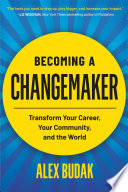

‘Becoming a Changemaker’ serves as a comprehensive guide for individuals aspiring to create positive social change. The book is structured around key principles and actionable strategies that empower readers to become ef...
Continue readingThe book emphasizes the importance of adopting a growth mindset to become a changemaker. This mindset encourages individuals to view challenges as opportunities for growth rather than obstacles. By fostering resilience a...
Continue readingA key theme in 'Becoming a Changemaker' is the identification of social issues that need addressing. The authors argue that understanding the root causes of these issues is crucial for effective change. They encourage re...
Continue readingThe book highlights the significance of collaboration and networking in driving change. Changemakers are encouraged to build relationships with others who share similar goals and values. The authors stress that no one ca...
Continue readingA practical framework presented in the book is the design thinking approach, which emphasizes empathy, ideation, and prototyping. This approach encourages changemakers to deeply understand the needs and experiences of th...
Continue readingThe authors stress that failure is an inherent part of the changemaking journey. Resilience is crucial for overcoming setbacks and continuing to pursue one’s mission. The book provides strategies for building resilience,...
Continue readingAn essential aspect of becoming a changemaker is the ability to measure the impact of one’s work. The authors discuss various methods for evaluating the effectiveness of initiatives and scaling successful solutions. They...
Continue readingThe book explores how technology can be a powerful tool for changemakers. It discusses various technological innovations that have the potential to drive social change, from social media campaigns to data analytics and m...
Continue readingThe reading time for Becoming a Changemaker depends on the reader's pace. However, this concise book summary covers the 7 key ideas from Becoming a Changemaker, allowing you to quickly understand the main concepts, insights, and practical applications in around 25 min.
Becoming a Changemaker is definitely worth reading. The book covers essential topics including The Power of Mindset, Identifying and Understanding Social Issues, Collaboration and Networking, providing practical insights and actionable advice. Whether you read the full book or our concise summary, Becoming a Changemaker delivers valuable knowledge that can help you improve your understanding and apply these concepts in your personal or professional life.
Becoming a Changemaker was written by Alex Budak.
If you enjoyed Becoming a Changemaker by Alex Budak and want to explore similar topics or deepen your understanding, we highly recommend these related book summaries:
These books cover related themes, complementary concepts, and will help you build upon the knowledge gained from Becoming a Changemaker. Each of these summaries provides concise insights that can further enhance your understanding and practical application of the ideas presented in Becoming a Changemaker.